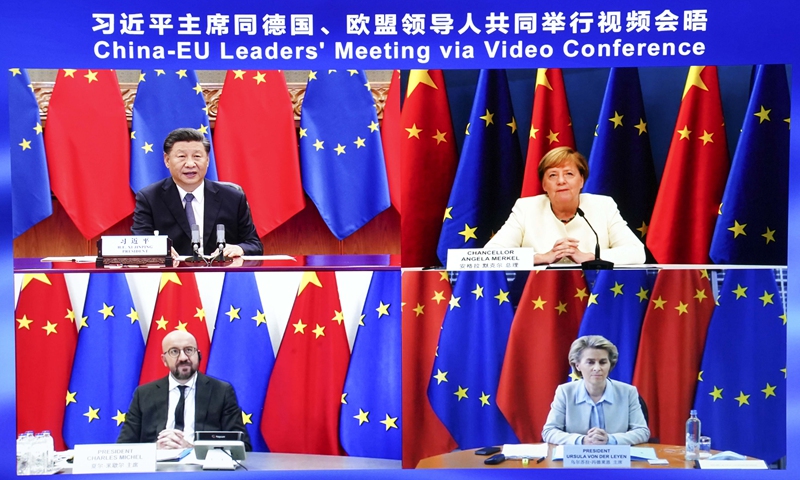China, Germany urged to dial up partnership
Green and digital industries ‘important’ stabilizers for bilateral investment

Chinese President Xi Jinping co-hosts a China-Germany-EU leaders' meeting in Beijing, capital of China, Sept. 14, 2020, via video link with German Chancellor Angela Merkel, whose country currently holds the EU's rotating presidency, European Council President Charles Michel and European Commission President Ursula von der Leyen. Photo: Xinhua
Germany and China could accelerate their mutual opening-up process to maintain the sound momentum in bilateral trade and investment relations, Chinese analysts said on Wednesday, as the vital talks for a China-EU bilateral investment treaty (BIT) enter the final phase.
Currently, there is growing political will in Beijing and Berlin that the two largest economies, respectively in Asia and Europe, will keep opening-up to each other, which will create even greater benefits for both peoples.
Chinese experts suggest both governments remove barriers to trade and investment. And, Germany is asked to offer an open environment for Chinese enterprises, as the country is reportedly mulling an information security bill that could add more regulatory constraints on Chinese telecom equipment suppliers, such as Huawei Technologies.
The bill is seen as a reaction by Berlin to US politicians' call for a so-called "clean network" that excludes Chinese companies such as Huawei.
Zheng Chunrong, a professor of German Studies at Tongji University in Shanghai, told the Global Times while the bill is not explicitly worded to target at Huawei, it is important that China and Germany both move in a positive direction.
"Germany is always asking China to open its market wider, and it would be unacceptable for China if Germany moves to shut its doors to selected Chinese companies," Zheng told the Global Times on Wednesday.
Despite the outbreak of the coronavirus crisis, China's economic relations with Germany and the EU have continued to grow.
In the second quarter, China surpassed the US and became Germany's largest export market for the first time, having imported goods worth nearly 23 billion euros ($27.25 billion) from Germany. The figure illuminates the prospects for trade and investment cooperation between the two major economic powers, experts say.
China also became the EU's largest trading partner for the first time, with bilateral trade up 2.6 percent to 328.7 billion euros despite the pandemic.
In the first seven months of this year, 245 German firms entered the Chinese market, according to data from China's Ministry of Commerce. German giants like premium carmaker BMW and chemical giant BASF also made increasing investments in China.
Zheng said as the two countries both have the ambition to develop their green and digital economies, and are partners in such fields, those sectors are expected to serve as vital connections in future cooperation.
Chinese experts advocate Germany should ramp up its efforts to facilitate negotiations of the China-EU bilateral investment treaty to conclude as soon as possible.
China has sent a strong signal to the world by announcing its intention to favorably consider joining the Comprehensive and Progressive Agreement for Trans-Pacific Partnership, after the signing the Regional Comprehensive Economic Partnership, which is the world's largest free trade zone.
Experts said Germany, as the leading economy of EU, will play an important role in concluding the BIT talks and reaching a final agreement within this year, or risk pushing the timeline out by a few years.
Cui Hongjian, director of the Department for European Studies at the China Institute of International Studies, told the Global Times on Wednesday that there are still sticking points on issues of market access, labor protection and environmental protection, which could jeopardize the deadline that will arrive in about one month.
The deal, which will inject certainty and a framework into bilateral investment relations amid the headwinds of anti-globalization and unilateralism, will require the two sides to meet each other halfway if it is to be completed, Cui said, noting that "the deal could still be concluded before the year's end."
A number of EU countries, including Germany and France, have rolled out bills that put constraints on business mergers and the way foreign governments subsidize their companies in recent years, and it has put Chinese investors on alert, according to media reports.
Zheng said some EU negotiators are asking for unrealistic concessions from China and the deal can only be reached by two sides meeting each other halfway
After the BIT is concluded, the two sides could move on to a feasibility study of setting up a China-EU free trade zone, Zheng said.


